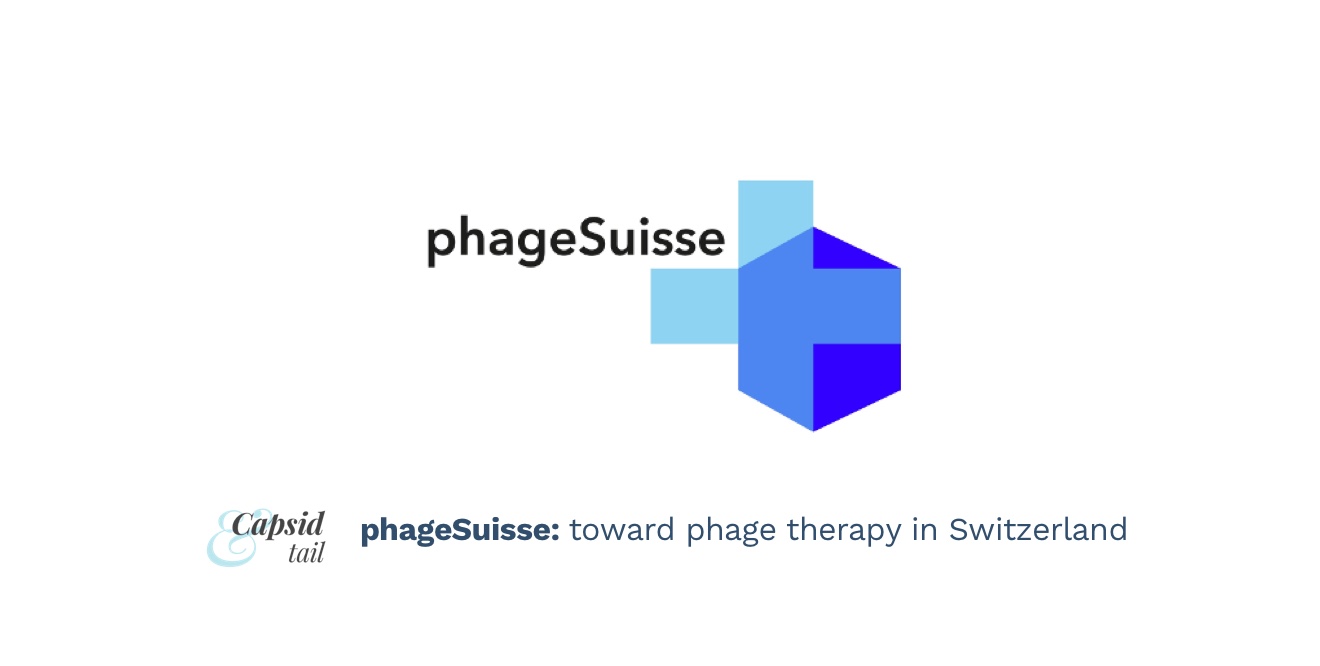phageSuisse is a non-profit organization from Switzerland. One of our goals is to inform health authorities, politicians and the population about the use of bacteriophages for human therapeutic purposes.
For this we have launched a small webinar series in 2020-2021, and we will provide you with a short recap of four sessions. All events can be found on our website.
Fundamental aspects of bacteriophage research
“Temperate bacteriophages and the evolution of the Staphylococcus aureus lineage 398”
Link to the paper
Speaker: Dr. Floriane Laumay, Genomic Research Laboratory, Infectious Diseases Service, Geneva University Hospitals, Switzerland / Institut des Agents Infectieux, Centre de Biologie du Nord, Hospices Civils de Lyon, France
After a brief introduction about the history of bacteriophages, Dr. Laumay gave us an overview about the different types of bacteriophages, the lytic and the temperate phages. We also received a summary about the evolution of Staphylococcus. aureus species during the last 15 years.
She presented the impact of prophages on the virulence by characterized S. aureus strains. The virulence was measured by the adhesion to human fibrinogen, fibronectin, invasion of human non phagocytic cells (HEK 293) and finally in vivo with a rat endocarditis model.
During her talk Dr. Laumay showed the impact that temperate bacteriophages have on the virulence of bacteriophages and warned about the complete characterization of phage cocktails to avoid the presence of temperate bacteriophages within virulent phages.
phageSuisse meets industry
Link to the webinar
“Industrial production of bacteriophages”
Speaker: Dr. Frenk Smrekar - CEO Jafral
Jafral focuses on the production of phage-based products for various (GMP and non-GMP) applications for food industry, cosmetics, veterinary and human therapeutics. Dr. Smrekar gives insights into the bacteriophages industry. Jafral is certified for production of cell, banks, phage banks, drug substances, drug products and placebo.
“ε2-Phages Are Bred to Improve the Standard of Care for Staphylococcal Infections”
Speaker: Dr. Lorenzo Corsini - CEO Phagomed
Phagomed develops targeted antimicrobials for treating chronic persistent diseases based on bacteriophages and endolysins. The therapeutics are developed on the base of a synthetic biology platform. Dr. Corsini presents current drug candidates for Staphylococcus aureus infections. The approach allows for patenting of bacteriophages.
Clinical research and case reports
“Moving clinical trials for phage therapy forward”
Speaker: Dr. Shawna McCallin, Clinical Coordinator, Department for Neuro-Urology, Balgrist University Hospital, Zürich, Switzerland
Currently, we use antibiotics to treat bacterial infections in humans. Bacteriophages are very different from antibiotics. They are self-amplifying, host dependent and have a high diversity. Bacteriophages have a long clinical history especially in states of the former USSR, e.g. Russia, Poland and Georgia. However, western regulatory authorities have yet to approve any bacteriophage preparations.
Bacteriophage therapy seems to be “stuck” between phase II and phase III studies. We hear more and more success stories of bacteriophage treatments of bacterial infections in case studies, but (successful) clinical trials are ultimately needed.
To bridge this gap, Dr. Shawna McCallin presents what is missing in clinical trials for the approval of bacteriophages. The local bacterial epidemiology should be explored thoroughly. It is also important to clearly define the population and indication specification for correct site selection. Newly developed adaptive designs for clinical trials are a possibility, however, they need clear rules and a strong statistical plan. Treatment effects and design characteristics, such as inferiority or superiority design, play a huge role in designing clinical trials. For this, it is important to be aware of the accurate estimate of control or placebo effect to conduct correct power calculations. To ensure overall feasibility, make sure that all methods have been validated and try to use validated clinical effect symptom severity scales. Currently, many clinical indications do suffer from an imperfect understanding.
To track individual treatments, an International Database for Phage Therapy for the report case studies has been developed. Expectations are high, and we need to keep them realistic!
"Clinical use of bacteriophages”
Link to the webinar (in French)
Speaker: Prof. Tristan Ferry Infectious and Tropical Diseases Unit, Croix-Rousse Hospital , Hospices Civils de Lyon, Lyon France
Prof. Tristan Ferry presents the activities of the Infectious and Tropical Diseases Department of the Croix-Rousse Hospital. The experience is accompanied by the testimony of his patient François d’Aviau de Piolant who treated with bacteriophages following a multi-resistant endocarditis.
Learn more
Head to the phageSuisse website to learn more about the organization!
Want to write about your phage organization or initiative?
Check out the C&T guest writer guide for info on how to get an article published with us. If you’re a company, check out our Sponsor page for more options.
Thank you to our volunteers, Steph Lynch and Atif Khan, for finding and summarizing links for C&T this week!







